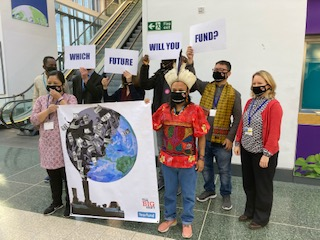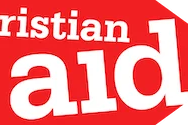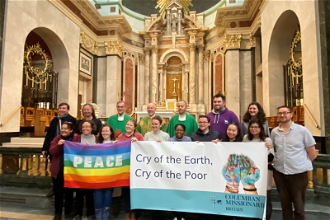COP26 Blog 12: Crunch Time and getting crunched

Protest at COP26. Which future would you fund?
The image of an indigenous woman wiping the tears of a 'red rebel' at a street protest in Glasgow yesterday touched many. And no less than Mary Robinson of The Elders was tearful this morning as she told Sky News that "we are not aligned to 1.5 C at the moment" although "to be on track for this is doable." She felt political commitment, "needs a crisis mindset that cares about the future of humanity and our beautiful world."
A frustrated Robinson blamed the leaders of Brazil, Australia and Saudi Arabia in particular of not being in crisis mode and accused the last as consistently taking the language of gender and human rights out of international climate agreements.
Saudi Arabia is part of the huge fossil fuel lobby at COP26, and she wanted this challenged. She hoped peoples on the frontline of climate change and transition would be listened to more seriously. Also, she hoped Greta Thunberg would be proved wrong in her view that the conference would simply be 'Blah Blah Blah'.
It was crunch time today as the first draft of the COP26 declaration was made public and the summit moved into its final days. The dichotomy between the powerful and the vulnerable was evident. It was Transport Day at COP26, and leading car manufacturers were given a platform to air their promises. Volvo called electric vehicles "a core part of future planning" and Uber wanted to "clean up urban transport". Meanwhile, the London Mining Network was tweeting from a protest outside the conference entrance. Indigenous and mining activists gathered in the cold under the banner, 'SAY NO to dirty mining our way to clean energy'. Speakers from Indonesia, Guyana and Philippines, as well as representatives of the Neskonlith and Nuxalk First Nations called for the energy transition to be centred on "human rights, community consent, transformative solutions."
We should be aware of the complexity around the issue of what eco-theologian Thomas Berry called the 'great work' of transitioning. My family is very proud of our electric car, but I now know that a huge increase in mining of lithium - used in electric cars - is controversial. Mapuche Indians in Chile report that extensive lithium mining is already destroying areas used by nesting flamingoes and community agriculture and they want to regain control of their land and food production. They are trying to resist being crunched in the world's system and reject such terms as 'green extractivism' and 'climate smart mining' which are now commonly used by mining corporations. There are no benchmarks to measure these concepts. The mining protesters don't want to become 'sacrifice communities' in the name of addressing climate change and providing car manufacturers with the raw materials to make their transition vehicles.
Indigenous representatives also delivered a letter to the US Consulate in Glasgow, host of the US delegation, demanding the US 'build back fossil free'. They left the letter in the door and an oil rig on the front steps!
On transport, there are three sectors: ground transportation, maritime transport and aviation." Of these, planes are especially problematic. Not only do they produce greenhouse gases, including water-vapour, but they release them high in the atmosphere, where their climate impact is magnified. More needs to be done to reduce the need for travel and to improve local public transport. Under the Paris agreement of the 2015 COP21 summit, countries didn't have to include international aviation or maritime emissions in their national contributions. There was no direct mention of cars either, leaving those emissions to countries to address in their individual action plans.
There are no easy answers. Today, a coalition of 346 organisations from 78 countries issued a joint statement warning that "the hydropower industry is gearing up for a massive greenwashing effort to present its destructive product - which has been shown time and again to destroy ecosystems and communities - as the pathway out of our predicaments." While highlighting the harms of dams - from exacerbating methane emissions and jeopardizing freshwater species to violating the human rights of impacted communities - the statement emphasised that, "free-flowing rivers and natural lakes have immense value for the welfare of the ecosystems they sustain, humankind, and survival on the planet."
And it isn't only in the global south where you find disempowered communities facing economic and military might. Glasgow has seen several 'Toxic Tours' showing that within a few miles of the COP26 conference are the offices of Teekay Shipping - an oil and gas shipping company - and two banks that fund fossil fuels - PG Morgan Chase and Barclays Bank. Close by is the Strathclyde Pension Fund, Scotland's richest pension fund, which is estimated to have £800 million-worth of investments in fossil fuel companies. Further afield, the Grangemouth oil refinery complex on the Firth of Forth is the largest climate polluter in Scotland. Its gas flares and cooling towers are visible across the Scottish Lowlands. The Mossmorran Petrochemical facilities - operated by Shell and ExxonMobil - output significant greenhouse gas and cause ill health to the local community. Faslane, the home of Britain's expensive and dangerous nuclear weapons, is only 26 miles from Glasgow. The city itself has also seen a demonstration outside BAE Systems because, in the words of one protester, "our governments have allowed spending on arms to outstrip spending on climate solutions."
The mismatch between political pledges and what is happening in the natural world at this crucial period drew Prime Minster Boris Johnson back to COP26 today and travelling by train this time! While he was back at the summit The Climate Coalition, the UK's largest grouping of campaigners on climate change, called for finalising a deal that keeps 1.5°C alive, protects nature and delivers finance to support those on the frontline. "We need to power on through the blockages" Johnson said. But he stopped short of spelling them out as Mary Robinson did this morning?


















